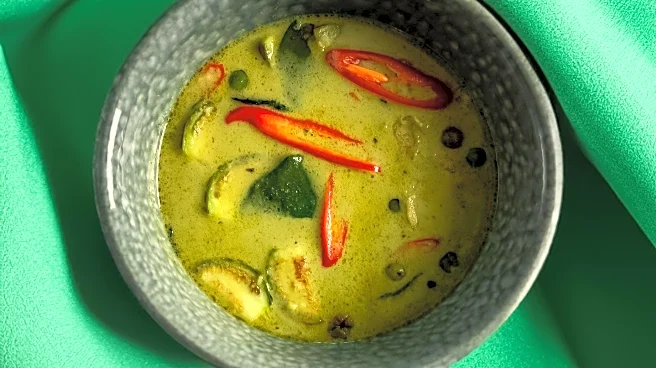What's Happening?
Thai cuisine has become a significant cultural and culinary staple in Los Angeles, with the city hosting the largest Thai population outside of Thailand. Food critic Bill Addison highlights Thai food as a 'pillar cuisine' of the city, showcasing its diverse flavors and micro-regional cooking styles. Addison has curated a list of his favorite Thai restaurants in Los Angeles, emphasizing the unique culinary experiences they offer. Anajak Thai in Sherman Oaks, for example, is renowned for its creative menu and Thai Taco Tuesday phenomenon, while Ayara Thai in Westchester is celebrated for its khao soi dish. Holy Basil in Atwater Village offers experimental dishes that blend various cultural influences. These restaurants reflect the rich heritage and innovative spirit of Thai cuisine in Los Angeles.
Why It's Important?
The prominence of Thai cuisine in Los Angeles highlights the city's multicultural landscape and its ability to embrace diverse culinary traditions. This cultural integration not only enriches the local food scene but also fosters a deeper understanding and appreciation of Thai culture among residents and visitors. The success of Thai restaurants in Los Angeles demonstrates the city's openness to global influences and its role as a culinary hub. As these establishments continue to thrive, they contribute to the local economy and offer employment opportunities, while also preserving and promoting Thai cultural heritage.
What's Next?
As Thai cuisine continues to gain popularity in Los Angeles, it is likely that more restaurants will emerge, offering innovative dishes and expanding the culinary landscape. The city's food critics and enthusiasts may further explore and document the evolution of Thai cuisine, potentially influencing dining trends and preferences. Additionally, the success of Thai restaurants could inspire other ethnic cuisines to establish a stronger presence in Los Angeles, further diversifying the city's food scene.
Beyond the Headlines
The rise of Thai cuisine in Los Angeles may also have implications for cultural exchange and diplomacy, as food often serves as a bridge between different communities. The growing interest in Thai food could lead to increased cultural events and collaborations, fostering mutual understanding and respect. Furthermore, the emphasis on authentic and high-quality ingredients in Thai cooking may encourage sustainable practices and a focus on local sourcing within the restaurant industry.









